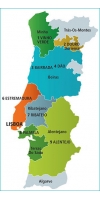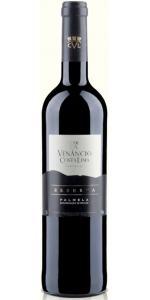Wine from Palmela

Palmela is a Portuguese region located on the Setubal Peninsula. Palmela consists of both plains and hills in the terroir. The main grape type is Castelao, which is a red grape variety. At one time the plains and hills had their own respective wine region titles; however they were combined into the Palmela DOC in 2009. The plains are made up of sandy, deep soil helps the Castelao ripen fully. The wines from Palmela typically have cherry flavors with balance and mature tannin. Fernão Pires and Moscatel de Setúbal are the whites produced in Palmela, however it is important to point out that the Moscatel wines are under the Setubal DOC.
Venancio da Costa Lima Palmela Reserva is made from 100% Castelao (also known as Periquita)
Intense garnet color, complex nose with touches of ripe fruit, jam and spices, full-bodied flavor and a very balanced finish.
100% Castelao (also known as "Periquita" and "Joao de Santarem". As the most widely-grown red grape variety in Portugal it is still often referred to in Portuguese as Periquita, although that name is legally owned by José Maria da Fonseca in the Setúbal Peninsula outside of Lisbon. It is highly adaptable to different climatic conditions and its remarkable versatility enables winemakers to make a range of wines – from the easy drinking and quaffable reds and rosados to the powerful and intense reds perfectly suited to lengthy cellaring. Castelão comes into its own and is most expressive in the Sétubal Peninsula, where it makes meaty and intense wines with aromas of red berries and blue flowers that marry well with the deft use of oak.
Made from 45 year old vines.
Classic vinification at controlled temperature (25 °C) with prolonged maceration for phenolic extraction. Wine went through malolactic fermentation.
Wine was slightly fitered before bottling to avoid sedimentation in the bottle and to ensure stability.
Pasta, Cheese, red meat and game.
- back
Selected Options
Regions
Categories
Pricing
Countries
Regions
Grape Types
Wineries
Organic/Free Shipping
The origin of Lot C-91 began in the fall of 1969 when Joe Heitz created this one-off cuvée, which was very normal in those days, as a more premium version of his already iconic Napa Valley Cabernet Sauvignon bottling. Joe envisioned Lot C-91 as a greater step up in quality from the Napa Valley Cabernet Sauvignon, with a higher quality of fruit sourcing, coming exclusively from the sought-after single vineyards of Heitz Cellar.
Lot C-91 is the culmination of 50 years of tireless effort, trial and error, and the continual desire to make a unique expression of the heralded vineyards of Heitz Cellar.
Review:
Wow. Such a racy and exciting nose! This is quite agile and nimble, full of red and blue berries in the forefront, then complemented by spiced orange, earl grey, red plums, potpourri, savory plums and chocolate. Tense and elegant on the palate, which is all about succulent red berries, nuance and texture. Nothing redundant here. A great Napa cabernet sauvignon that has real definition. A beauty by all accounts!
-James Suckling 96 Points
In 1969, Heitz produced a one-off cuvée called Lot C-91. It was thought of as an elevated version of the Napa Valley Cabernet – a 'best of the best' blend from sites throughout Napa. After a bottle of the '69 turned up and turned heads at a Heitz wine dinner, the winemaking team decided to produce a modern iteration. It's comprised of vineyards in four AVAs: Rutherford (34%), Oakville (34%), Howell Mountain (17%) and St Helena (15%). The dazzling nose instantly shows off the component from Martha's Vineyard and on the palate it walks the line between succulent, powerful, herbal and floral, showing none of the heat of the 2017 vintage. As of June 2020, this was still a barrel sample, while many Napa 2017s are already on the market.
-Decanter 96 Points
Walt Clos Pepe Pinot Noir is made from 100 percent Pinot Noir.
Deep ruby in color, the wine carries luscious fruit aromas of blackberry preserves and dark cherry, infused with exotic notes of spice, black tea and pomegranate. The palate opens to a dense and velvety texture laced with flavors of barrel char and salinity, leading to a structured and focused finish.
Review:
Big and rich, with luscious spiciness to the plush dark fruit and berry flavors that are supported by medium-grained tannins. There's plenty of creamy and toasty accents on the open-textured finish.
-Wine Spectator 93 Points
Another Sta. Hills release, the 2019 Pinot Noir Clos Pepe Vineyard saw 10% stems and 10 months in 40% new French oak. It's a little more focused and firm, with classic ripe black raspberry, red plum, and cherry fruits as well as orange blossom, spice, and floral nuances. It too is medium-bodied, textured, and beautifully balanced.
-Jeb Dunnuck 93 Points





